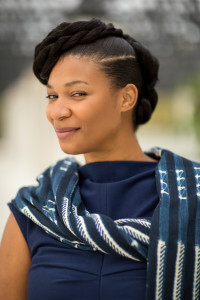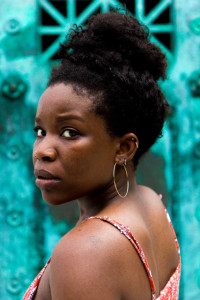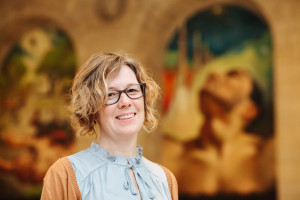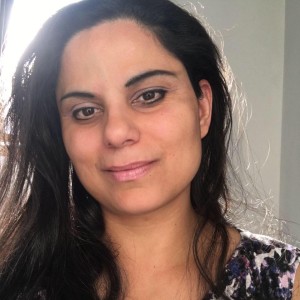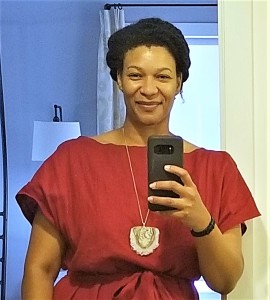 In her FPP Interview, Ashaki Jackson shares that despite writing on being surveilled and targeted as a Black person in the United States, and how grief for Black Americans feels either “iterative” or “unending,” her parents were still able to create a profound sense of protection for her, and what that meant. Jackson also shares what brought her peace during the pandemic quarantine, and much more. Read her interview then RSVP to join us virtually on Sunday, April 18, 2021 from 6-8pm to hear Ashaki Jackson read with Ed Baptist, I.S. Jones, Kristin Palm, and Alison Stine.
In her FPP Interview, Ashaki Jackson shares that despite writing on being surveilled and targeted as a Black person in the United States, and how grief for Black Americans feels either “iterative” or “unending,” her parents were still able to create a profound sense of protection for her, and what that meant. Jackson also shares what brought her peace during the pandemic quarantine, and much more. Read her interview then RSVP to join us virtually on Sunday, April 18, 2021 from 6-8pm to hear Ashaki Jackson read with Ed Baptist, I.S. Jones, Kristin Palm, and Alison Stine.
We met the poems of Surveillance in 2016, and just as police officers have not stopped killing Black people with enduring impunity, your poems have remained as relevant to the moment as anything on tonight’s evening news. How have you been coping with this – our – reality? Do you feel anything has changed since when you first wrote these poems?
I cannot tell if grief is iterative or unending, you know? How does one cope with war? And when I say “war,” I mean that an armed group has been fighting against our existence in this nation for generations. It feels old, and so do I. It ages you. Despite knowing that killing Black Americans is a beloved and protected pastime in this nation, it’s such a worn and evil act antithetical to the All Lives Matter creed. I wrote Surveillance knowing that my work was not new rather it was in the tradition of a police brutality cannon. I wrote fully knowing that at any given time three living generations of Black people and Brown people were stuck in this dark loop of witnessing these deaths and knowing the outcome—grandparents, parents, children all spinning in an intimate, collective memory of violence.
In a 2014 interview, poet Khadijah Queen asked you about coping with distractions to your work and you shared how you found being “swallowed by the mundane” comforting. Examples you gave included “inundating [yourself] with a Big Bang Theory-spring cleaning-pedicure session or reading books in a loud restaurant.” The reading answer made my heart ache for pre-pandemic days, and the relative ease and safety of taking off to sit and read in a crowd, and how that can boost one’s mood and spark creativity. How have you been coping with the pain and restrictions of the past year?
I’ve found some peace during the pandemic. My full-time position is high stress, and I was relieved to get space from the physical office. I commend the families who sheltered in place and the household leads who managed their personal fears along with those of everyone else in the house. My goodness, what is it like to keep everyone in a household alive and vigilant?! I sat still during the pandemic’s first two seasons. There was such an odd push for normalcy that didn’t feel fair. I shed activities that added more work to my day or didn’t bring me joy. I bought friends’ books to read. I practiced making pralines. I let my hair do what it wanted and took care of my skin since I had the time. I bought a plant that seems to enjoy life and really comfortable pajama sets in which I’ve never invested before. And sometimes I joined friends online. I put meaningful effort into surviving happily.
You have written powerfully about what it’s like to be surveilled not just as a Black person in our society, but as a Black person simply trying to live and be protected in one’s home. Could you share what “home” means to you now, and how the meaning has possibly changed for you over time?
Home is where my parents reside. That is the first place I knew and understood protection. After the essay you reference was published, my parents shared other instances when we were not safe. They quietly assembled protections for us and refused to let me (as a child, as a teenager, and as a young adult) think I was anything other than protected. Any place that I have lived as an adult, I consider temporary because it is not with my greatest protectors. I’m grateful to all protectors.
You have been an active and committed community leader in the literary arts. What have you learned from this work?
One lesson of many is that publications, activities, and events produced by the literary community come from care. Yes, there are practical and financial reasons for these products, but they are also ways of giving gifts to each other that are long-lasting and memorable. Even curation is an act of care for writers and their audiences.
It’s April 2021. What gives you hope? What gives you pause?
It took a pandemic to disabuse us of the grind mindset. I am hopeful that we continue prioritizing rest and care for ourselves and others, checking in, protecting personal time. Yes, there are reasons for pause at every turn and life challenges to honor; but I now choose to engage at my pace, to read friends’ books and write for joy. I choose to lean into the wholeness of “no” for self preservation. I get to live a different (better) quality of life.


